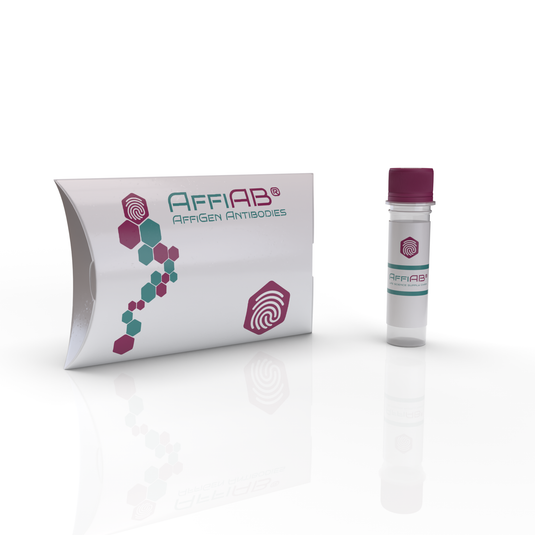AffiAB® Goat Anti-P53 Polyclonal IgG Antibody
AffiAB® Goat Anti-P53 Polyclonal IgG Antibody is a high-quality antibody designed to provide reliable detection of P53 protein. It has been validated in western blotting and immunofluorescence, offering excellent specificity and sensitivity in research applications.
Host: Goat
Species: Human
Description:
The AffiAB® Goat Anti-P53 Polyclonal IgG Antibody is an antibody designed to specifically target and detect the P53 protein. P53, also known as TP53, is a tumor suppressor protein that plays a crucial role in regulating cell cycle progression, DNA repair, and apoptosis. It is one of the most extensively studied proteins due to its involvement in various cellular processes and its association with cancer.
This polyclonal antibody is produced by immunizing goats with purified P53 protein or a specific peptide sequence derived from P53. Following immunization, the antibody is purified from goat serum to ensure high specificity and quality.
The AffiAB® Goat Anti-P53 Polyclonal IgG Antibody is widely used in research applications to investigate the expression, localization, and function of P53 in normal and diseased cells. It allows researchers to study P53's role in tumor suppression, DNA damage response, and apoptosis pathways.
By targeting P53, researchers can examine its levels and post-translational modifications in response to cellular stress, DNA damage, or oncogenic signaling. This antibody is commonly used in techniques such as Western blotting, immunohistochemistry, immunofluorescence, and immunoprecipitation, enabling the analysis of P53 expression and localization in different experimental settings.
It's important to note that the AffiAB® Goat Anti-P53 Polyclonal IgG Antibody specifically targets P53 and may not cross-react with other proteins. Researchers should validate the antibody's performance and specificity in their specific experimental conditions and ensure proper controls are included.
In summary, the AffiAB® Goat Anti-P53 Polyclonal IgG Antibody is a valuable tool for studying the P53 protein and its involvement in cellular processes, particularly in cancer research. It allows researchers to gain insights into P53's role in tumor suppression, DNA repair, and apoptosis, contributing to a better understanding of cancer biology and potential therapeutic strategies.
Gene Identifier/Accession Number: ENSG00000141510
Form: N/A
Concentration: 2.5 mg/mL
Type: Primary
Clonality: Polyclonal
Isotype: IgG
Conjugation: Unconjugated
Application: Western Blot, Immunofluorescence
Storage: For continuous use, store at 2-8 °C for one-two days. For extended storage, store in -20 °C freezer. Working dilution samples should be discarded if not used within 12 hours.
Special instructions: The antibody solution should be gently mixed before use.
Goat Anti-P53 Polyclonal IgG Antibody
Cellular health is safeguarded by a complex network of proteins and pathways, and one of the key guardians of genomic stability is the p53 protein. p53, also known as the "guardian of the genome," is a tumor suppressor protein that plays a crucial role in regulating cell cycle progression, DNA repair, and apoptosis. In the realm of scientific research, the Goat Anti-p53 Polyclonal IgG Antibody has emerged as an indispensable tool for studying the functions and implications of p53 in cellular processes and disease.
Understanding the Significance of p53
p53 is a transcription factor encoded by the TP53 gene. It acts as a central hub in cellular response to stress, including DNA damage, hypoxia, and oncogene activation. In response to such stressors, p53 regulates the expression of numerous target genes involved in DNA repair, cell cycle arrest, and apoptosis. Dysregulation of p53 is implicated in various cancers and genetic disorders, making it a focal point of research in the field of oncology and molecular biology.
Goat Anti-p53 Polyclonal IgG Antibody: An Overview
The Goat Anti-p53 Polyclonal IgG Antibody is a specialized antibody designed to target p53 proteins. This antibody is generated through the immunization of goats with purified p53 protein, resulting in a polyclonal mixture of immunoglobulins G (IgG) capable of recognizing multiple epitopes on the p53 molecule. Its polyclonal nature enhances its versatility, making it an invaluable asset for a wide range of experimental applications.
Applications of Goat Anti-p53 Polyclonal IgG Antibody
Western Blotting:
Researchers utilize this antibody in Western blot assays to quantify p53 protein levels in cell lysates or tissue extracts. This application is instrumental for studying changes in p53 expression and post-translational modifications under various experimental conditions.
Immunoprecipitation (IP):
The antibody is used in IP assays to isolate p53-associated protein complexes, shedding light on its interactions with other molecules and its role in specific cellular processes.
Immunofluorescence (IF) and Immunohistochemistry (IHC):
Scientists employ this antibody in IF and IHC experiments to visualize the subcellular localization of p53 within cells and tissues. These techniques enable the assessment of changes in p53 distribution under different biological contexts.
Functional Studies:
The Goat Anti-p53 Polyclonal IgG Antibody can be applied in functional assays to investigate the impact of p53 modulation on cell cycle regulation, DNA repair, and apoptosis, providing crucial insights into its roles in cellular homeostasis.
Cancer Research:
p53's role as a tumor suppressor makes it a focal point in cancer research. Researchers use this antibody to explore the underlying mechanisms and potential therapeutic targets associated with p53-related malignancies.
Conclusion
The Goat Anti-p53 Polyclonal IgG Antibody is an invaluable asset in molecular and cellular biology research. Its specificity, versatility, and reliability make it an indispensable tool for investigating the functions of p53 in cellular processes and understanding its implications in health and disease. As scientists continue to uncover the intricacies of p53-mediated pathways, this antibody remains a trusted partner in their quest for knowledge and advancements in cancer research and beyond.

